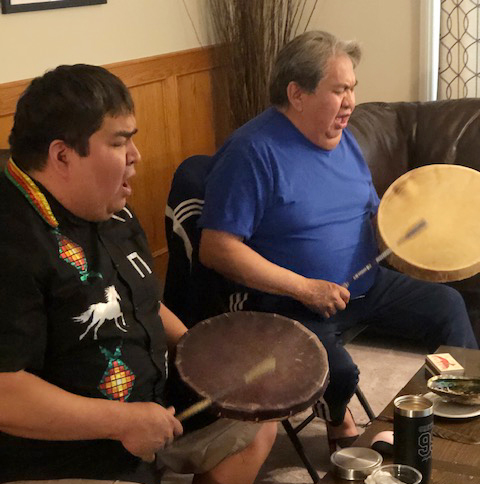By Ashlea Cook
No one is given a handbook for life with instructions of how to handle the situations we may encounter. Sometimes though, we are lucky enough to come across a human or group of humans that can assist us through the crazy ups and downs of life. Thanks to the staff running the Ee-Des-Spoom-Ooh-Soop program at Closer to Home, a number of Indigenous parents and families are able to benefit from the healing and guidance of this unique program.
One of those individuals is Lily*, a mother of two who discovered the program while at a community event with her daughter. Lily shared that she was initially hesitant to join the Intergenerational Healing Circle for Women, a branch of the overarching Ee-Des-Spoom-Ooh-Soop program, unaware of how much her life had been affected by intergenerational trauma.

Darcy and Frank Turning Robe have been leading virtual drumming and healing circles out of Closer to Home’s Pekewe House.
The Intergenerational Healing Circle for Women, run by our Pekewe Elder Marsha Hanson and Elder Kerrie Moore, brings together a group of no greater than 13 women for seven weeks to share, learn, and reflect as they move towards healing.
Amanda, the Indigenous Program manager, shared that within this group they strive to meet each individual where they are at in their healing journey, creating a safe place to share and reflect.
Lily echoed this sentiment, as she so openly stated that she “was closed up at first, but soon became ready to open up, and then everything came out.”
Lily stated that the group and the conversations they had “took away a lot of the shame, and the feeling of being isolated in my own struggles.”
“Crying at every session, but instead of hearing ‘don’t cry, don’t worry’, my tears were encouraged as they were viewed as healing.”
Through these moments, Marsha and Kerrie completed Indigenous smudging rituals with sage to cleanse, to purify, and to give love. Lily so eloquently stated that through her participation in this group, she felt she was stepping forward with a lighter disposition, encouraged by the facilitators to “live in the best light that we could, and to do things with love.”
Amanda shared the importance of these healing circles, noting that intergenerational trauma has the power to affect so many, as it can reach children not directly affected, and it takes seven generations to heal from such trauma.
Outside of the healing circle, Drumming Circles within the program bring individuals together to meet others, build life skills, and learn the Indigenous practice of drumming. Darcy Turning Robe leads two drumming circles – one for men and one for all who wish to participate. Frank Turning Robe also leads the men’s drumming circle.
These drumming circles have carried on through these challenging times of the COVID-19 pandemic, recreating the circles virtually through the use of video meetings. And although we may think that so much connection is lost when not physically present with others, Lily shared how she felt that the leaders of the Indigenous programs are still able to portray the welcoming qualities you felt in person across a screen with their warm smiles and caring words.
The Closer to Home team problem-solves to ensure access, so as many people as possible can still receive these warm smiles and caring words in a time when they are so desperately needed.
Amanda shared that a pivotal piece to the success of these programs is that those who participate choose to do so – these programs are never mandated or forced upon anyone. Participants often hear of these amazing programs through word of mouth, and firsthand experience and stories from their peers.
As Lily said, “You know you need some kind of healing, but you don’t know what it is, and somehow these healing circles find the healing you need.”
This is echoed in the meaning behind Ee-Des-Spoom-Ooh-Soop: “the environment that gives the opportunity to guide our lives forward in a positive direction.” And this passionate group will continue to do so even when it has to be done across the medium of a screen.
* Name changed to protect privacy

